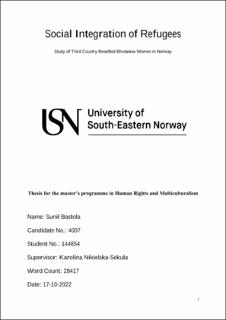| dc.description.abstract | This research studies the social integration prospects of third-country resettled Bhutanese refugee women in Norway in line with theoretical inferences of Social Integration Framework by Friedrich Heckmann. The concepts of core domains of integration of Ager & Strang and Translocational Positionality Framework of Anthias are also used to discuss the thematic findings. It explores the structural, cultural, identification and integrative aspects of women to understand integration outcomes in a Norwegian society, their challenges
This research is carried out in a qualitative approach by using semi-structured interview method. It collected data from 12 participant Bhutanese refugee women living in Norway via third country resettlement program. They are selected using snowball sampling method. The data are collected through face-to-face open-ended questions and are analysed using thematic analysis method.
The research exhibits the structural integration has been quite more successful than other aspects of integration. It is found that they have good excess to housing, work, education, health, and welfare system. They are given political rights as citizens. However, it has become very difficult and challenging for them to be culturally integrated. Initially, the aged women had strong roots in their own culture, which made it difficult for them to adapt to Norwegian culture. Bi-cultural competence and acceptance is found more developed in young women and girls which has helped in their integration process. Interactive integration of the women was promoted through their social networks. Those who secured a job and those who pursued education got better chances for interaction and social participation which strengthened their social network. This interactive integration also became very challenging for elderly women due to the lack of exposure to education, job market, and weak social network. The shift in national identity and identifications is seen and changed related to positionality and time. From the conducted study, besides having many different challenges, Bhutanese refugee women are in the process of integration into Norwegian Society. | |
